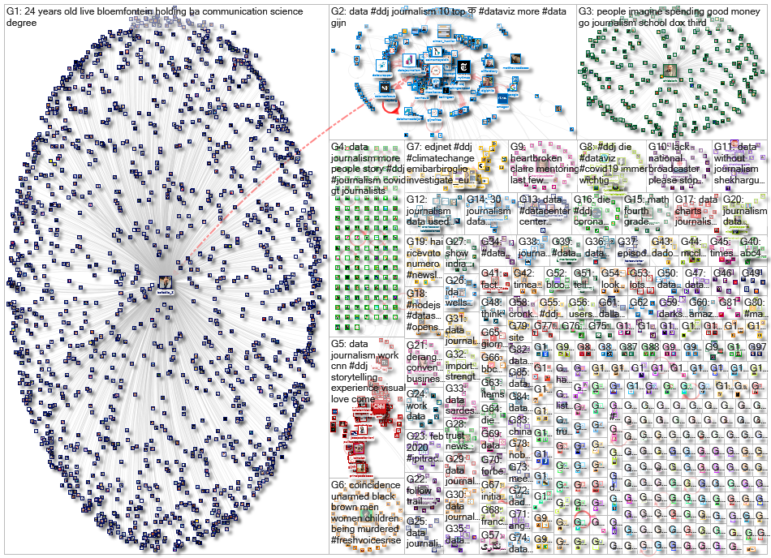Driving an electric car and buying solar panels are widely thought of as ways to help slow climate change. But according to a new study, most people don’t realize that achieving a real impact on greenhouse emissions may require significant lifestyle sacrifices. Our NodeXL #ddj mapping from April 12 to April 18, which tracks the most popular data journalism stories on Twitter each week, found a story by the Financial Times showing that the best way individuals can reduce their carbon footprint is to have one less child. In this edition, we also feature an explainer of Ramadan fasting around the world by Al Jazeera, a look into China’s polysilicon factories by Bloomberg, and Chinese tycoon Jack Ma’s jet setting ways.
Breathing Safely
One of the lessons from the pandemic is that indoor air quality is crucial to reducing transmission of the coronavirus. Technology and smart design have enabled many restaurants to take better care of their customers. One example: the Sierra Mar restaurant in California’s Big Sur has put in place tabletop mini-purifiers, real-time air quality monitoring, and upgraded its heating and air conditioning systems. The Washington Post explained how the new setup works.
Mini-purifiers on the table, HEPA purifiers between guests, an upgraded heating and air conditioning system, and real-time air quality monitoring. See how one restaurant experimented with new tech to clean the air https://t.co/oJGAVjvWN2 pic.twitter.com/iYmbKPHP5J
— Post Graphics (@PostGraphics) April 14, 2021
Jack Ma’s Jet Trips
Following a clash with Chinese regulators, businessman Jack Ma has only made one public appearance since last October. But the Financial Times has obtained details of the billionaire’s private jet flights. The outlet found that Ma’s private jet took a trip once every two days in 2018 for a total of 173 flights.
Jack Ma's private jet took 173 flights in 2018. That's one almost every two days! @qgis temporal controller comes to the rescue again. Really pleased how the custom Robinson projection worked out.
Read @rwmcmorrow & Sun Yu's articlehttps://t.co/u2evEcmpQy#gistribe #dataviz pic.twitter.com/zSe7Fh1VAh
— Steven Bernard (@sdbernard) April 15, 2021
Europe’s Emissions Trading Scheme
In Europe, a trading scheme implemented in 2005 was designed to combat climate change and reduce greenhouse gas emissions. Those who produce emissions need to pay for them, according to the plan. But an analysis by VoxEurope, republished by the European Data Journalism Network, argues that the scheme is not working properly and needs to be reformed.
'The 🇪🇺 #EUETS a more ambitious tool and make sure the polluter pays’, says Wijnand Stoefs, from @CarbonMrktWatch, in the 2nd part of @EmiBarbiroglio’s📊 take on the brilliant research by @investigate_eu | #ddj #climatechange @EDJNet #CarbonEmissions https://t.co/ec9Yf6HNvU
— Voxeurop in English (@VoxEurop) April 15, 2021
China’s Polysilicon Factories
Polysilicon, which is used to make solar panels, has become vital to the world’s green future. But factories producing this raw material in China’s remote Northwest region of Xinjiang are cloaked in uncertainty and secrecy. Bloomberg looked into accusations of forced labor inside some of the factories and mapped suspected re-education camps and detention facilities.
The world’s green power surge depends on polysilicon made in China’s remote Northwest. No one really knows what’s going on inside the facilities https://t.co/bSOdVqZ5q4 via @climate pic.twitter.com/JKCquLmyZ0
— Bloomberg Graphics (@BBGVisualData) April 13, 2021
Fasting in 2021
Mid-April marked the beginning of the holy month of Ramadan, a period in which Muslims fast from pre-sunrise to sunset, abstaining from eating, drinking, smoking, and sex to become closer to God. Al Jazeera created a series of infographics to compare the number of fasting hours in cities around the world; in Cape Town right now, fasting Muslims will have an 11-12 hour fast, while in London the period lasts up to 17 hours.
THREAD 👇
The pre-sunrise to sunset fast during #Ramadan lasts anywhere from 10 to 21 hours depending on where you live. Here's a look at fasting hours around the world https://t.co/JuIayodWPt pic.twitter.com/7cGaszRZPy
— Al Jazeera English (@AJEnglish) April 8, 2021
A Volcano Awakes
А series of explosive eruptions from the La Soufriere volcano have rocked the Caribbean island of St. Vincent. After 42 years of inactivity, the volcano started to erupt in early April, prompting the evacuation of thousands of residents. Since then, volcanic ash has blanketed much of the island, destroying crops, contaminating water, and killing animals. Reuters Graphics used satellite images to explain the damage caused so far.
Explaining the series of eruptions from #LaSoufrière which have devastated St Vincent's infrastructure and prompted a sea and land evacuation of thousands of residents. #StVincent https://t.co/AbMEFswvGw
— Reuters Graphics (@ReutersGraphics) April 17, 2021
Carbon Footprints
Recycling as much as possible. Buying renewable energy. Replacing cars with an electric or hybrid model. According to an international survey of 21,000 people in almost 30 countries, most people believe these are the three best ways of reducing our individual carbon footprints. But an analysis by the Financial Times illustrates that, in reality, there are more important steps we need to take. One of the most effective ways to reduce greenhouse gas emissions, they write, is by having one less child.
What are the most effective ways of reducing your carbon footprint? @C_BruceLockhart and I take a look at the @IpsosMORI data in a recent survey. Interestingly the most effective way was the least obvious to those polled.
Read Chelsea's article https://t.co/xv0UAIOGig#dataviz pic.twitter.com/unsMgrVjEw— Steven Bernard (@sdbernard) April 17, 2021
Costs of Climate Change
Climate change also brings economic costs, and around the world, rising temperatures have worsened extreme events such as storms, floods, and heatwaves. A piece by Voxeurop found that, as a result of these incidents, European countries alone have lost a total of 446 billion euros over the past four decades — a figure “equal to nearly 3% of the gross domestic product of the countries analyzed.”
The economic cost of the damage caused by #climatechange since 1980 in #Europe is in the hundreds of billions euro. Check out the 📊 data-driven story by Daniele Ruzza. #ddj @EDJNet https://t.co/uQSYsRbajs
— Voxeurop in English (@VoxEurop) April 12, 2021
Lungs of the Earth
The Virunga National Park in the Democratic Republic of the Congo is home to one of the most extensive tropical forests in the world. Every day, more than 700 rangers from the Congolese Institute for the Conservation of Nature work in extremely difficult conditions, risking their lives to monitor the tranquility of the park and prevent deforestation and poaching. The guards also protect mountain gorillas and other endangered species. The Lungs of the Earth project, published by Spanish newspaper El País, tells the story of this remarkable ecosystem and the people taking care of it.
🌳+🦍 NEW: Our #LungsOfTheEarth project in Central Africa has been published by @Planeta_Futuro by El País in Spanish.
Meet the rangers who protect the @gorillacd and check the full story out, with videos and dataviz https://t.co/XgQuZj1AbQ @pulitzercenter @Code4Africa pic.twitter.com/O7ah09IBi6
— Jacopo Ottaviani (@JacopoOttaviani) April 15, 2021
Eating Habits
Ever wondered what a data visualization from the 1930s looks like? This image from Alice Urbach’s 500-page cookbook “So Kocht Man in Wien!” — which translates as “How to Cook in Vienna!” — and tweeted by reporter Nicolas Kayser-Bril, shows how much food a human being consumes over a lifetime.
Dataviz from 1935 shows how much a human being eats over a lifetime (tin soldier shown for scale between the peas and the cheese).
From Alice Urbach's "So kocht man in Wien!" pic.twitter.com/S2ezBU80HU
— Nicolas Kayser-Bril (@nicolaskb) April 12, 2021
Thanks again to Marc Smith and Harald Meier of Connected Action for gathering the links and graphing them. The Top Ten #ddj list is curated weekly.
 Peter Georgiev is GIJN’s social media and engagement editor. Previously, he was part of NBC News’ investigative unit in New York. He also worked as a correspondent for Bulgarian National Television and his reporting has been published by the Guardian, Deutsche Welle, and other international outlets.
Peter Georgiev is GIJN’s social media and engagement editor. Previously, he was part of NBC News’ investigative unit in New York. He also worked as a correspondent for Bulgarian National Television and his reporting has been published by the Guardian, Deutsche Welle, and other international outlets.


